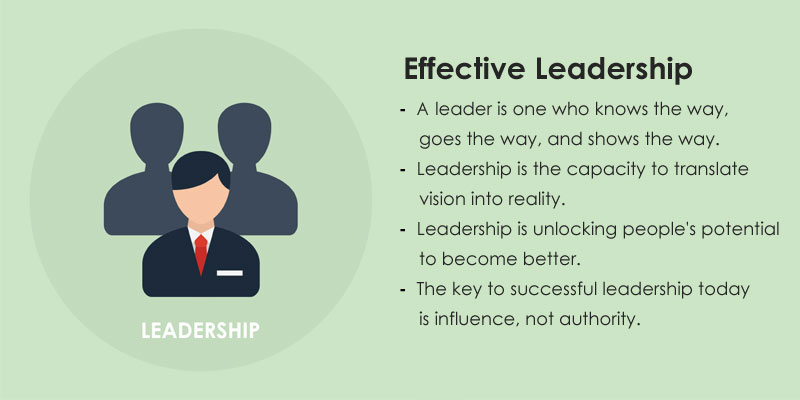Leadership is about ascertaining a method for people to contribute so that it can result in a significant achievement.
What is Leadership?

It is a process that enables a person to influence others to achieve a goal and directs an organization to become rational and consistent. Leaders carry out these processes by leveraging their leadership traits such as values, ethics, and knowledge.
Good Leadership Qualities
Good leaders are not born. They are made. If a person has the willpower and the ability to learn, he can become a successful leader. A good leader engages in a continuous process of education, experience and training. He studies to improve his leadership skills and does not rest on past glory. One’s position as a manager or supervisor gives one the authority to handle responsibilities and achieve the desired results making him the boss. Leadership is different. It inspires the followers, makes them raise the bar and set themselves higher goals.
- Continuous Learning: Good leaders continually seek education and training to improve their skills.
- Willpower: A strong willpower is essential for becoming a successful leader.
- Ability to Inspire: Effective leaders inspire their followers to set and achieve higher goals.
- Responsibility: Leaders handle responsibilities and achieve desired results beyond just being a boss.
- Visionary: Good leaders have a clear vision and can guide others towards it.
- Empathy: Understanding and empathizing with team members is crucial for leadership.
- Communication Skills: Effective communication is key to leading successfully.
- Adaptability: Leaders are adaptable and can navigate through changing circumstances. (Source: Ohio State Pressbooks)
Theories on Leadership
There are various theories of leadership. According to the Trait Theory, certain personality traits may lead people spontaneously into leadership roles. A difficult situation or a crisis may bring out the latent leadership qualities in a person, which is referred to as the Great Events Theory. The most widely accepted theory today is the Transformational Leadership Theory, which states that leadership skills can be mastered by people who wish to become leaders. When a person respects an individual as a leader, he does not take into account the leader’s attributes but rather evaluates his actions and makes an assessment. This observation helps him learn if he is a trustworthy leader or a selfish individual.
- Great Man Theory: Leaders are naturally endowed with key traits like charisma. These traits make them effective leaders. (Sources: [Corporate Finance Institute])
- Trait Theory: Focuses on identifying specific characteristics common among leaders. These traits can be used to predict leadership effectiveness. (Sources: [WGU])
- Transformational Leadership: This type of leadership emphasizes inspiring and motivating employees by aligning their sense of purpose with the mission of the organization. Transformational leaders build trust, mutual respect, support, and open communication with their followers. (Source: [Ohio State Pressbooks])
- Contingency Theory: Asserts that the best leadership style depends on the context. Leaders must adapt to the situation at hand. (Sources: [Corporate Finance Institute])
- Behavioral Theory: Suggests leadership is based on specific behaviors, which can be learned. This theory moves away from innate traits. (Sources: [WGU])
- Servant Leadership: This theory emphasizes the leader as a servant first, focusing on emotional intelligence to encourage passion in others. Servant leaders are deeply caring, set ethical examples, and are driven to support others. (Source: [Ohio State Pressbooks])
Leaders in an organization
Serving selflessly and taking everybody along in his stride in developing an organization makes a person an acceptable leader. In the opinion of the employees, leadership is that which advances the organizational goals, while taking care of employees’ well being. People like to be led by those whom they respect. To earn respect, leaders have to be moral and principled. They can provide a powerful vision of the future with the sense of proper direction to the followers.
Components of Effective Leadership
According to experts, there are two very important components of effective leadership. One is belief and confidence in leadership, which is an indicator of employee satisfaction in the organization. The second is effective communication by the leadership in making the employees understand the business strategy, helping them understand and contribute to the achievement of the organization’s business objectives and sharing information about the organization with the employees for their benefit and guidance.
A leader should know what he is, what he knows and what he does. He should incessantly seek self-improvement. He should be familiar with the tasks and environment of employees. He should set an example to the rest of the employees. Inspiring, encouraging and enabling followers to share his vision and improve the organization’s performance are the tests of successful leadership.




I really want to work on my leadership skills and this might really help. Thank you for posting this.
i’m making plans for our political strategy on may 2010. building quality leaders is one. thank you.
thanks for posting this. it helped me on my report.. i get some of your concepts..hope you don’t mind.. thank you so much..
thanks very much for this post it really encourages my leadership and hopefully will help me this year
I always try to understand why we keep on saying “Good leaders are not born.” Simply but if I did not learn to be a leader then I wasn’t made to be a leader.
I really enjoyed and understood your explanation, it was simple and effective. Thanks for posting